| Product name: |
p53 (Acetyl Lys382) rabbit pAb |
| Reactivity: |
Human;Rat;Mouse; |
| Alternative Names: |
TP53; P53; Cellular tumor antigen p53; Antigen NY-CO-13; Phosphoprotein p53; Tumor suppressor p53 |
| Source: |
Rabbit |
| Dilutions: |
Western Blot: 1/500 - 1/2000. IHC-p: 1:100-300 ELISA: 1/20000. Not yet tested in other applications. |
| Immunogen: |
Synthesized acetyl-peptide derived from the human p53 around the acetylation site of K382. |
| Storage: |
-20°C/1 year |
| Clonality: |
Polyclonal |
| Isotype: |
IgG |
| Concentration: |
1 mg/ml |
| Observed Band: |
53kD |
| GeneID: |
7157 |
| Human Swiss-Prot No: |
P04637 |
| Cellular localization: |
Cytoplasm . Nucleus . Nucleus, PML body . Endoplasmic reticulum . Mitochondrion matrix . Cytoplasm, cytoskeleton, microtubule organizing center, centrosome . Recruited into PML bodies together with CHEK2 (PubMed:12810724). Translocates to mitochondria upon oxidative stress (PubMed:22726440). Translocates to mitochondria in response to mitomycin C treatment (PubMed:27323408). .; [Isoform 1]: Nucleus . Cytoplasm. Predominantly nuclear but localizes to the cytoplasm when expressed with isoform 4.; [Isoform 2]: Nucleus. Cytoplasm. Localized mainly in the nucleus with minor staining in the cytoplasm.; [Isoform 3]: Nucleus. Cytoplasm. Localized in the nucleus in most cells but found in the cytoplasm in some cells.; [Isoform 4]: Nucleus. Cytoplasm. Predominantly nuclear but translocates to the cy |
| Background: |
tumor protein p53(TP53) Homo sapiens This gene encodes a tumor suppressor protein containing transcriptional activation, DNA binding, and oligomerization domains. The encoded protein responds to diverse cellular stresses to regulate expression of target genes, thereby inducing cell cycle arrest, apoptosis, senescence, DNA repair, or changes in metabolism. Mutations in this gene are associated with a variety of human cancers, including hereditary cancers such as Li-Fraumeni syndrome. Alternative splicing of this gene and the use of alternate promoters result in multiple transcript variants and isoforms. Additional isoforms have also been shown to result from the use of alternate translation initiation codons (PMIDs: 12032546, 20937277). [provided by RefSeq, Feb 2013], |




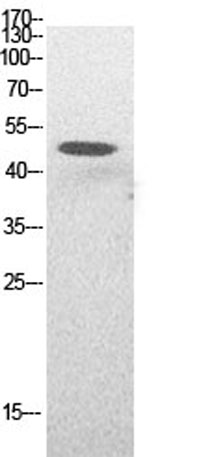 Western Blot analysis of HepG2 cells using Acetyl-p53 (K382) Polyclonal Antibody. Antibody was diluted at 1:500. Secondary antibody(catalog#:RS0002) was diluted at 1:20000
Western Blot analysis of HepG2 cells using Acetyl-p53 (K382) Polyclonal Antibody. Antibody was diluted at 1:500. Secondary antibody(catalog#:RS0002) was diluted at 1:20000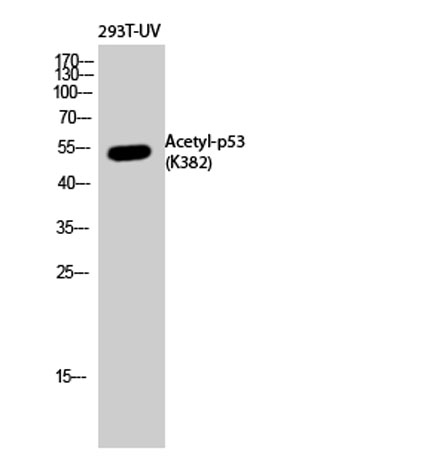 Western Blot analysis of 293T-UV cells using Acetyl-p53 (K382) Polyclonal Antibody diluted at 1:500. Secondary antibody(catalog#:RS0002) was diluted at 1:20000
Western Blot analysis of 293T-UV cells using Acetyl-p53 (K382) Polyclonal Antibody diluted at 1:500. Secondary antibody(catalog#:RS0002) was diluted at 1:20000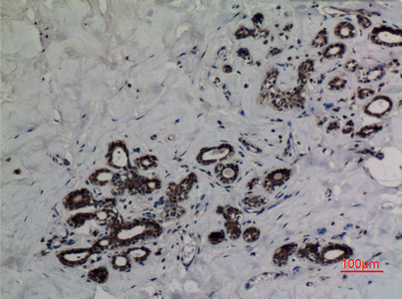 Immunohistochemical analysis of paraffin-embedded human-breast, antibody was diluted at 1:100
Immunohistochemical analysis of paraffin-embedded human-breast, antibody was diluted at 1:100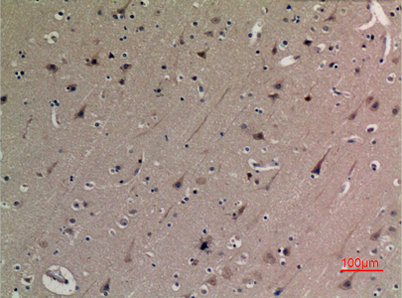 Immunohistochemical analysis of paraffin-embedded human-brain, antibody was diluted at 1:100
Immunohistochemical analysis of paraffin-embedded human-brain, antibody was diluted at 1:100在線咨詢
技術(shù)支持


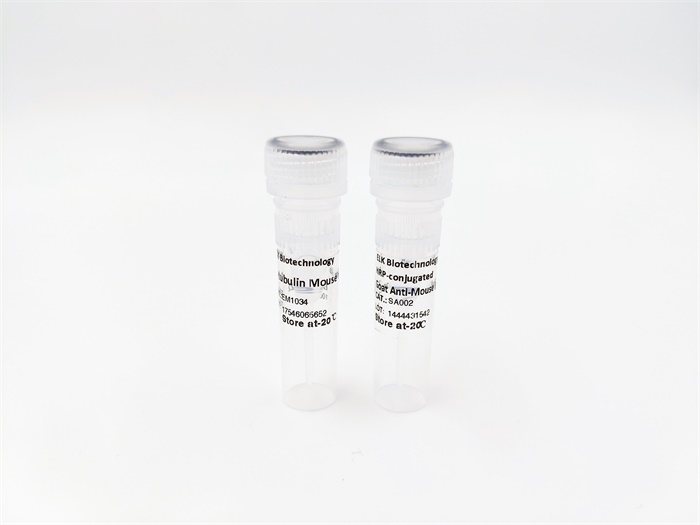
 下載說明 ①
下載說明 ①



